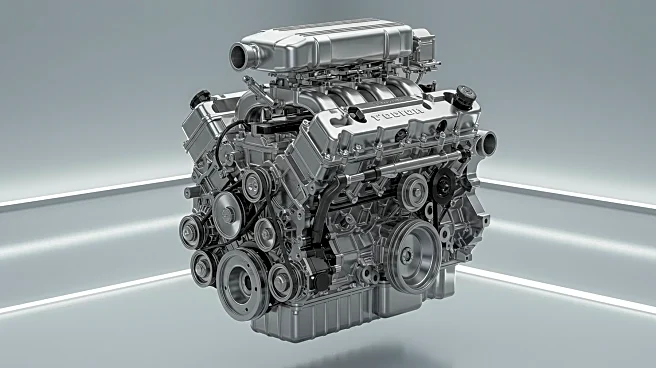What's Happening?
A recent revelation has highlighted the shared engineering between Ford Motor Company and Land Rover, particularly concerning the engines used in certain Land Rover models. Mechanic Larry Law, known for his automotive insights, shared a viral clip demonstrating that some Land Rover vehicles feature engines stamped with 'Ford Motor Company.' This discovery points to the historical collaboration between Ford and Land Rover, especially during Ford's ownership of Land Rover from 2000. During this period, several V8 engines used in Land Rover models were produced at Ford's Bridgend Engine Plant in Wales. The AJ-V8 engine family, designed by Jaguar, was manufactured at this facility, showcasing the shared production resources between the brands. Despite the British design, these engines were built using Ford's production capabilities, highlighting the economic strategy of component sharing in the automotive industry.
Why It's Important?
The revelation of Ford's involvement in Land Rover's engine production has significant implications for vehicle owners and the automotive industry. For Land Rover owners, the use of Ford-sourced components can simplify maintenance and repair processes, as Ford's extensive service network can facilitate easier access to replacement parts. This shared engineering also suggests a level of proven durability, given Ford's track record with these components. However, the discovery may challenge perceptions of exclusivity among luxury vehicle buyers, who might expect entirely bespoke engineering under the Land Rover brand. This situation underscores the broader industry practice of component sharing, which allows manufacturers to achieve cost efficiencies while maintaining brand identity.
What's Next?
Following the closure of Ford's Bridgend Engine Plant in 2020, Land Rover has shifted its engine production in-house, investing in its Wolverhampton Engine Manufacturing Centre. This move represents a strategic shift towards greater self-reliance in manufacturing capabilities. As Land Rover continues to develop its production facilities, it may further refine its engineering processes to enhance brand exclusivity and meet consumer expectations for luxury and performance. The automotive industry will likely continue to see collaborations and shared engineering as manufacturers balance cost efficiencies with brand differentiation.
Beyond the Headlines
The practice of component sharing in the automotive industry raises questions about brand identity and consumer expectations. While it offers economic benefits, it also challenges the notion of luxury and exclusivity, as high-end brands incorporate elements from broader platforms. This dynamic reflects the complex interplay between economics and brand perception, influencing how consumers value and perceive luxury vehicles.









